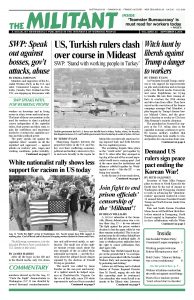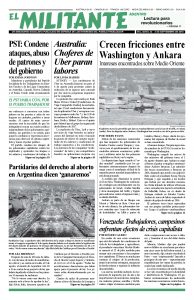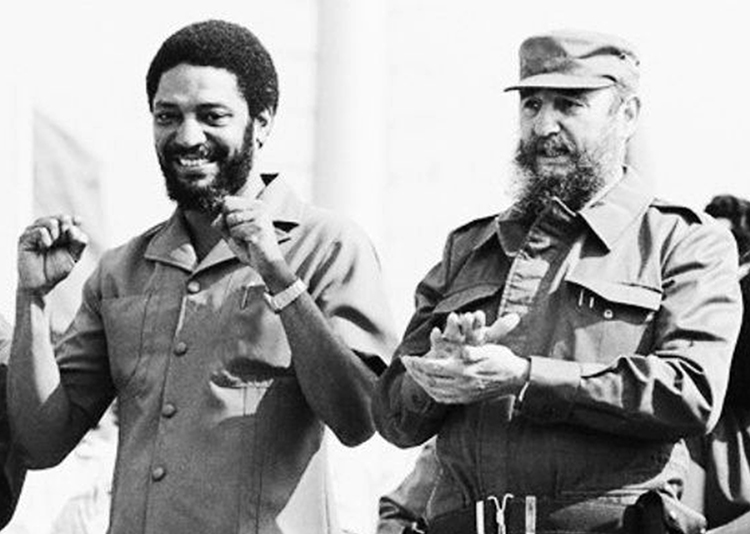Below is a speech by Fidel Castro given in Havana on Nov. 14, 1983, to more than 1 million people gathered to honor 24 Cuban volunteers who were killed during the U.S. invasion of Grenada. It’s included in Maurice Bishop Speaks, one of Pathfinder’s Books of the Month for September. Bishop was the central leader of the 1979 Grenada Revolution, leading workers and peasants to take political power into their own hands. The Cuban leadership viewed Bishop and the Grenadian Revolution as a powerful reinforcement.
In a Stalinist-inspired coup led by Bernard Coard, the workers and farmers government was overthrown in 1983 and Bishop was murdered. The coup killed the revolution, opening the door to a U.S. military invasion. Copyright © 1983 by Pathfinder Press. Reprinted by permission.
In Grenada, we followed the same principle we apply to all revolutionary nations and movements, full respect for their policies, criteria, and decisions, expressing our views on any matter only when asked to do so. …
Bishop was not an extremist; rather, he was a true revolutionary — conscientious and honest. Far from disagreeing with his intelligent and realistic policy, we fully sympathized with it, since it was rigorously adapted to his country’s specific conditions and possibilities.
Grenada had become a true symbol of independence and progress in the Caribbean. No one could have foreseen the tragedy that was drawing near. Attention was focused on other parts of the world.
Unfortunately, the Grenadian revolutionaries themselves unleashed the events that opened the door to imperialist aggression. Hyenas emerged from the revolutionary ranks. Today no one can yet say whether those who used the dagger of divisionism and internal confrontation did so motu proprio [for their own ends] or were inspired and egged on by imperialism.
It is something that could have been done by the CIA — and, if somebody else was responsible, the CIA could not have done it any better. The fact is that allegedly revolutionary arguments were used, invoking the purest principles of Marxism-Leninism and charging Bishop with practicing a cult of personality and with drawing away from the Leninist norms and methods of leadership.
In our view, nothing could be more absurd than to attribute such tendencies to Bishop. It was impossible to imagine anyone more noble, modest, and unselfish. He could never have been guilty of being authoritarian. If he had any defect, it was his excessive tolerance and trust.
Were those who conspired against him within the Grenadian party, army, and security forces by any chance a group of extremists drunk on political theory? Were they simply a group of ambitious, opportunistic individuals, or were they enemy agents who wanted to destroy the Grenadian revolution? History alone will have the last word, but it would not be the first time that such things occurred in a revolutionary process.
In our view, Coard’s group objectively destroyed the revolution and opened the door to imperialist aggression. Whatever their intentions, the brutal assassination of Bishop and his most loyal, closest comrades is a fact that can never be justified in that or any other revolution. As the October 20 statement by the Cuban party and government put it, “no crime must be committed in the name of the revolution and freedom.” …
It is to our revolution’s credit that, in spite of our profound indignation over Bishop’s removal from office and arrest, we fully refrained from interfering in Grenada’s internal affairs. We refrained even though our construction workers and all our other cooperation personnel in Grenada — who did not hesitate to confront the Yankee soldiers with the weapons Bishop himself had given them for their defense in case of an attack from abroad — could have been a decisive factor in those internal events. Those weapons were never meant to be used in an internal conflict in Grenada and we would never have allowed them to be so used. We would never have been willing to use them to shed a single drop of Grenadian blood.
On October 12, Bishop was removed from office by the Central Committee, on which the conspirators had attained a majority. On the thirteenth, he was placed under house arrest. On the nineteenth, the people took to the streets and freed Bishop. On the same day, Coard’s group ordered the army to fire on the people and Bishop, [Unison] Whiteman, Jacqueline Creft, and other excellent revolutionary leaders were murdered.
As soon as the internal dissensions, which came to light on October 12, became known, the Yankee imperialists decided to invade.
The message sent by the leadership of the Cuban party to Coard’s group on October 15 has been made public. In it, we expressed our deep concern over both the internal and external consequences of the split and appealed to common sense, serenity, wisdom, and generosity of revolutionaries. This reference to generosity was an appeal not to use violence against Bishop and his followers.
This group of Coard’s that seized power in Grenada expressed serious reservations toward Cuba from the very beginning because of our well-known and unquestionable friendship with Bishop. …
[D]ue to our basic regard for the Grenadian people, we would not rush to take any steps with regard to technical and economic cooperation that could affect essential services or economic interests vital to the people of Grenada.
We could not accept the idea of leaving the Grenadians without doctors or leaving the airport, which was vital to the nation’s economy, unfinished. …
The thing that placed Cuba in a morally complex, difficult situation was the announcement that Yankee naval forces were en route to Grenada. Under those circumstances, we couldn’t possibly leave the country. …
In Grenada, however, the government was morally indefensible. And, since the party, the government, and the army had divorced themselves from the people, it was also impossible to defend the nation militarily, because a revolutionary war is only feasible and justifiable when united with the people. We could only fight, therefore, if we were directly attacked. There was no alternative.


